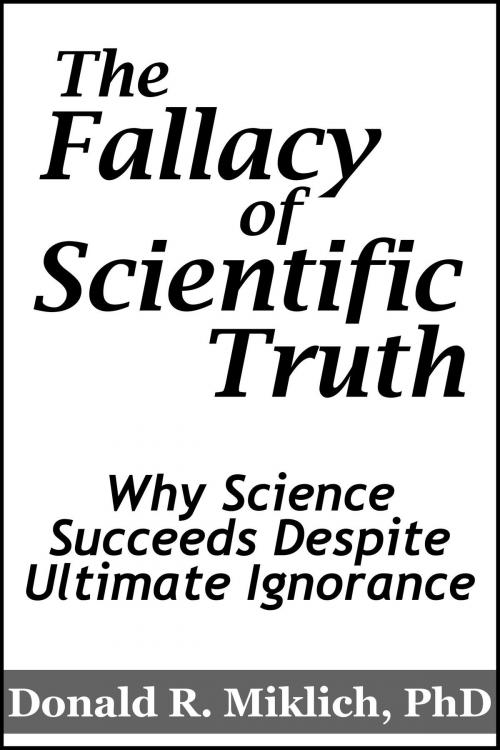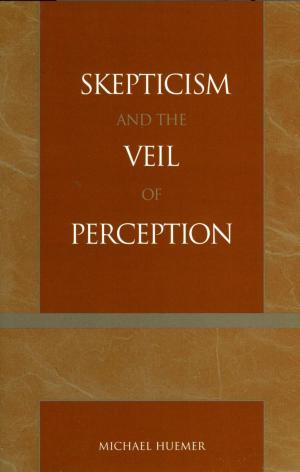The Fallacy of Scientific Truth: Why Science Succeeds Despite Ultimate Ignorance
Nonfiction, Religion & Spirituality, Philosophy, Epistemology| Author: | Donald R. Miklich | ISBN: | 9781311009135 |
| Publisher: | Donald R. Miklich | Publication: | November 7, 2014 |
| Imprint: | Smashwords Edition | Language: | English |
| Author: | Donald R. Miklich |
| ISBN: | 9781311009135 |
| Publisher: | Donald R. Miklich |
| Publication: | November 7, 2014 |
| Imprint: | Smashwords Edition |
| Language: | English |
Scientific knowledge is vastly and overwhelmingly humanity's greatest achievement. Furthermore, if humanity is to survive, either on this planet or perhaps eventually elsewhere in the universe, it will do so only because of scientific knowledge.
Nevertheless, scientific knowledge is not truth.
To assert any scientific knowledge to be true is to assert that beyond doubt we know the phenomena at issue occur for exactly and only the reason(s) specified by the scientific knowledge, and we similarly know they do so occur and will so occur at any time and at any place in the universe where the causal reason(s) obtain.
To claim scientific knowledge does not reach this truth standard is not new. Philosophers of science generally hold scientific knowledge always to be tentative and subject to refinement and/or replacement if and when new evidence is found. Therefore, scientists never use the word "truth" to describe their conclusions. Unfortunately, however, while theoretical scientists are too circumspect to call scientific conclusions true, they frequently treat them as if they were true. The most conspicuous examples of this are those cases, exceedingly common, wherein a scientific conclusion is used as the premise from which impossible-to-test deductions are drawn, and then these empirically unverifiable deductions are presented to the nonscientist public as certain scientific knowledge, the validity of which everyone who is not an intellectual troglodyte is obligated to accept and believe. The inescapable logical fact, however, is that no such deduction can be more certain than the uncertain scientific conclusion it is based on. Nevertheless, theoretical scientists have, with considerable success, propagandized and proselytized this illogical heretical scientific practice to the nonscientist public as standard procedure.
Scientifically, this disingenuous practice, this "Don't call scientific conclusions truth, but go ahead and treat them as truth anyway" practice has the cost of causing scientists to ignore the inescapable fact that scientific knowledge is a work in progress, and it always will be. Scientists must never close their minds to the possibility that even our most securely established scientific knowledge may be wrong, and might be improved if we made the effort. But more importantly, I am concerned that this practice of passing theoretical speculations off to the public as scientific knowledge may be partly responsible for the obstinate refusal of many nonscientists in the United States to accept and act upon scientific knowledge which is empirically well supported, scientific knowledge which has the well established ability to reliably improve human existence.
The purpose of this essay is to try to inform the scientifically skeptical nonscientist of the difference between such unreliable and untrustworthy theoretical science excesses and reliable scientific knowledge. Though not in this order, it will: Illustrate how theoreticians treat scientific knowledge as truth; Explain why scientific knowledge is not truth; Explain what scientific knowledge really is; Show why it is enormously successful, reliable and useful even though it is not truth; Point out how the presumption of scientific truth is itself destructive of scientific knowledge; and finally, Note the implications of all of this for theoretical and practical science issues.
Scientific knowledge is vastly and overwhelmingly humanity's greatest achievement. Furthermore, if humanity is to survive, either on this planet or perhaps eventually elsewhere in the universe, it will do so only because of scientific knowledge.
Nevertheless, scientific knowledge is not truth.
To assert any scientific knowledge to be true is to assert that beyond doubt we know the phenomena at issue occur for exactly and only the reason(s) specified by the scientific knowledge, and we similarly know they do so occur and will so occur at any time and at any place in the universe where the causal reason(s) obtain.
To claim scientific knowledge does not reach this truth standard is not new. Philosophers of science generally hold scientific knowledge always to be tentative and subject to refinement and/or replacement if and when new evidence is found. Therefore, scientists never use the word "truth" to describe their conclusions. Unfortunately, however, while theoretical scientists are too circumspect to call scientific conclusions true, they frequently treat them as if they were true. The most conspicuous examples of this are those cases, exceedingly common, wherein a scientific conclusion is used as the premise from which impossible-to-test deductions are drawn, and then these empirically unverifiable deductions are presented to the nonscientist public as certain scientific knowledge, the validity of which everyone who is not an intellectual troglodyte is obligated to accept and believe. The inescapable logical fact, however, is that no such deduction can be more certain than the uncertain scientific conclusion it is based on. Nevertheless, theoretical scientists have, with considerable success, propagandized and proselytized this illogical heretical scientific practice to the nonscientist public as standard procedure.
Scientifically, this disingenuous practice, this "Don't call scientific conclusions truth, but go ahead and treat them as truth anyway" practice has the cost of causing scientists to ignore the inescapable fact that scientific knowledge is a work in progress, and it always will be. Scientists must never close their minds to the possibility that even our most securely established scientific knowledge may be wrong, and might be improved if we made the effort. But more importantly, I am concerned that this practice of passing theoretical speculations off to the public as scientific knowledge may be partly responsible for the obstinate refusal of many nonscientists in the United States to accept and act upon scientific knowledge which is empirically well supported, scientific knowledge which has the well established ability to reliably improve human existence.
The purpose of this essay is to try to inform the scientifically skeptical nonscientist of the difference between such unreliable and untrustworthy theoretical science excesses and reliable scientific knowledge. Though not in this order, it will: Illustrate how theoreticians treat scientific knowledge as truth; Explain why scientific knowledge is not truth; Explain what scientific knowledge really is; Show why it is enormously successful, reliable and useful even though it is not truth; Point out how the presumption of scientific truth is itself destructive of scientific knowledge; and finally, Note the implications of all of this for theoretical and practical science issues.















